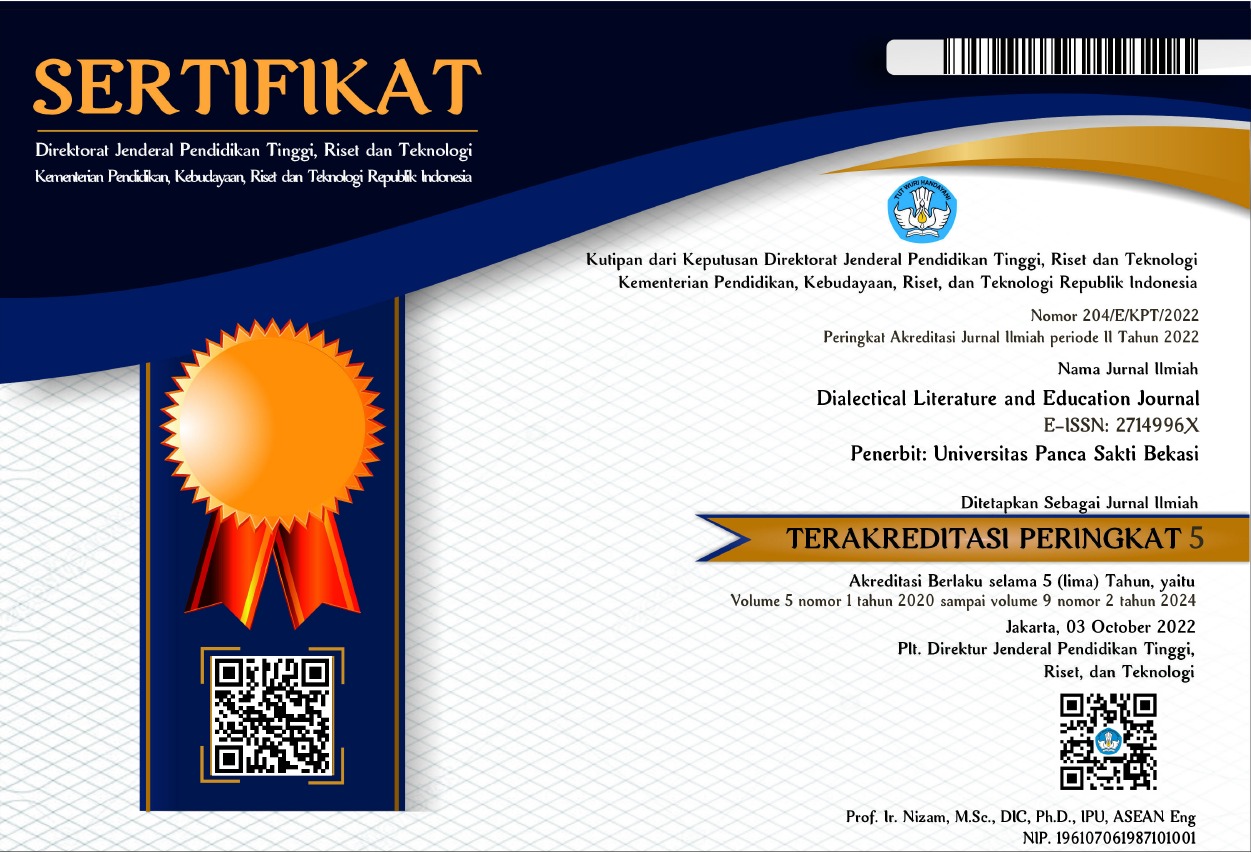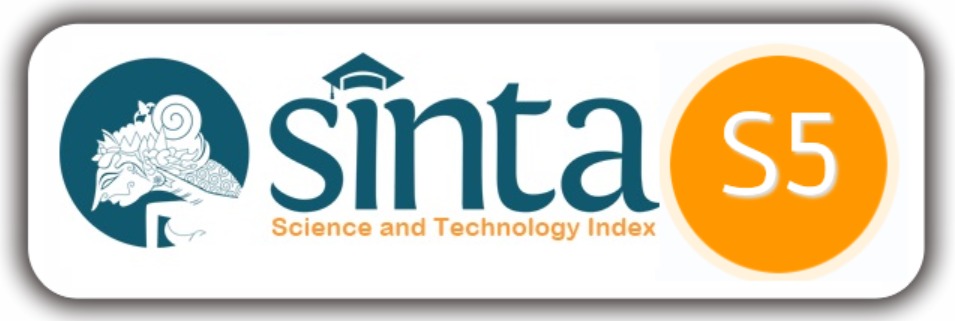THE EFFECT OF USING KAHOOT! APPLICATION ON STUDENTS' VOCABULARY
DOI:
https://doi.org/10.51714/dlejpancasakti.v7i1.76.pp.23-34Keywords:
Kahhot! Application, Students' Vocabulary, Experimental DesignAbstract
The aim of this study was to determine the effect of using Kahoot! application on students’ vocabulary at seventh grade of SMPN 6 Bekasi. This research was conducted in the academic year 2021/2022. This research method uses an experimental design. The sample of this study consisted of 40 students at the seventh grade and divided the students into 2 classes, namely the experimental class and the control class. This data was obtained by conducting a post test on the students. The post test for the experimental class is given through the Kahoot! application while the control class is given via Google Form. The reliability test analysis was carried out in this study using the SPSS program, with a value of 0.609 it can be said that the test is valid. The results of the post-test from both classes showed that the score of the experimental class was 1900 and the control class was 1470 which means there is a difference between the results of the post-test control class and the experimental class. This shows that the t test value has a significance level
Downloads
References
Almanar, M. A. (2019). Reviewing Students’ Vocabulary Mastery By Using Kahoot At Holmesglen Partnering With University of Muhammadiyah Tangerang. ACITYA Journal of Teaching & Education, 1(2), 78–87. https://doi.org/10.30650/ajte.v1i2.212 DOI: https://doi.org/10.30650/ajte.v1i2.212
Ayumi, & Chan, A. M. (2021). Improving Students English Vocabulary Using Kahoot! Proceedings of the 3rd International Conference on Educational Development and Quality Assurance (ICED-QA 2020), 506. https://doi.org/10.2991/assehr.k.210202.027 DOI: https://doi.org/10.2991/assehr.k.210202.027
Cárdenas-Moncada, C., Véliz-Campos, M., & Véliz, L. (2020). Game-based student response systems: The impact of Kahoot in a chilean vocational higher education EFL classroom. Call-Ej, 21(1), 64–78.
Choy, L. T. (2014). The Strengths and Weaknesses of Research Methodology: Comparison and Complimentary between Qualitative and Quantitative Approaches. Journal of Humanities and Social Science, 19(4), 99–104. DOI: https://doi.org/10.9790/0837-194399104
Dwi Nugroho, C. (2015). Pengaruh Penguasaan Kosa Kata dan Struktur Kalimat Terhadap Pemahaman Membaca. Deiksis, 7(3) http://dx.doi.org/10.30998/deiksis.v7i03.549
Flores Quiroz, M., Gutiérrez, R., Rocha, F., Valenzuela, P., & Vilches, C. (2021). Improving English Vocabulary Learning Through Kahoot!: a Quasi-Experimental High School Experience. Teaching English with Technology, 21(2), 3–13.
Hadfield, J. (1999). Intermediate Vocabulary Games Teacher’s Resource Book. USA: Pearson English Language Teaching
Hadijah, H., Pratolo, B. W., & Rondiyah, R. (2020). Interactive game “Kahoot!” as the media of students’ vocabulary assessment. Journal on English as a Foreign Language, 10(1), 87–105. https://doi.org/10.23971/jefl.v10i1.1670 DOI: https://doi.org/10.23971/jefl.v10i1.1670
Harmer, J. (2007). The Practice of English Language Teaching (fourth edition). England: Pearson Education Inc..
Licorish, S. A., Owen, H. E., Daniel, B., & George, J. L. (2018). Students’ perception of Kahoot!’s influence on teaching and learning. Research and Practice in Technology Enhanced Learning, 13(1). https://doi.org/10.1186/s41039-018-0078-8 DOI: https://doi.org/10.1186/s41039-018-0078-8
Llerena Medina, E. G., & Hurtado, C. P. R. (2017). Kahoot! A Digital Tool for Learning Vocabulary in a language classroom. Revista, 4(12), 441–449.
Mansur, M., & Fadhilawati, D. (2019). Applying Kahoot to Improve the Senior High School Students’ Vocabulary Achievement. VELES Voices of English Language Education Society, 3(2). https://doi.org/10.29408/veles.v3i2.1591 DOI: https://doi.org/10.29408/veles.v3i2.1591
Oktaria, A. A., Rohmayadevi, L., & Murwantono, D. (2021). Online Game Quiz “Kahoot” in Teaching English for Students of Smp Muhammadiyah Yogyakarta. PROJECT (Professional Journal of English Education), 4(2), 290. https://doi.org/10.22460/project.v4i2.p290-296 DOI: https://doi.org/10.22460/project.v4i2.p290-296
Plump, Carolyn M & LaRosa, J. (2017). Using Kahoot! in the Classroom to Create Engagement and Active Learning: A Game-Based Technology Solution for eLearning Novices. 2(2), 151–158. https://doi.org/https://doi.org/10.1177/2379298116689783 DOI: https://doi.org/10.1177/2379298116689783
Pratiwi, V. U., Astuti, P. I., Nurnaningsih, N., Arianti, A., & Setiyono, M. S. (2021). Pelatihan Penggunaan ‘Kahoot’ dalam Mengajar Reading Narrative bagi Siswa Kelas X SMA Veteran 1 Sukoharjo. Jurnal Surya Masyarakat, 3(2), 134. https://doi.org/10.26714/jsm.3.2.2021.134-142 DOI: https://doi.org/10.26714/jsm.3.2.2021.134-142
Richard, J. C., & Renandya, W. A. (2002). Metodology in Language Teaching: An Anthology of Current Practice. London: Cambridge University Press. DOI: https://doi.org/10.1017/CBO9780511667190
Salawazo, I. S., Simbolon, M., Hutabarat, V. E., Veronika, A. N., & Saragih, E. (2020). Analysis of Students’ Vocabulary in Learning English. Linguistic, English Education and Art (LEEA) Journal, 3(2). https://doi.org/10.31539/leea.v3i2.1017 DOI: https://doi.org/10.31539/leea.v3i2.1017
Thornburry, S. (2002). How to Teach Vocabulary. England: Longman..
Tóth, Á., Lógó, P., & Lógó, E. (2019). The effect of the kahoot quiz on the student’s results in the exam. Periodica Polytechnica Social and Management Sciences, 27(2), 173–179. https://doi.org/10.3311/PPso.12464 DOI: https://doi.org/10.3311/PPso.12464
Yuniarti, F., & Rakhmawati, D. (2021). Studi Kasus: Game Digital “Kahoot” dalam Pengajaran Bahasa Inggris. Jurnal Ilmiah Bina Edukasi, 1(1), 46–59.
Downloads
Published
Issue
Section
License
Copyright (c) 2022 Raihana Herlis Syahputri

This work is licensed under a Creative Commons Attribution-NonCommercial-ShareAlike 4.0 International License.
Authors retain copyright to the work and grant the journal right of first publication with the work simultaneously licensed under a Creative Commons Attribution-NonCommercial-ShareAlike 4.0.





























